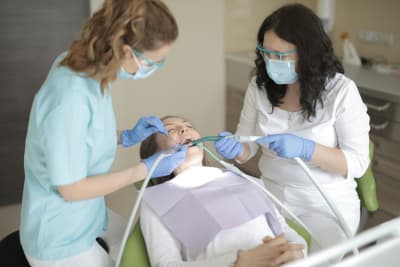The guide below offers a general overview of the requirements necessary to enter into the dental assistant discipline as a resident of Massachusetts. Candidates will have to follow some guidelines pertaining to individuals across the country while keeping in mind a few steps unique to the state of Massachusetts.
We analyze all of these below.
We begin by breaking down basic requirements and educational pathways before showing the steps needed for employment, continuing education, and professional opportunities through licensing and certification. The guide also explores specific high-quality programs.
Lastly, we will round up the possible annual average salary figures for fresh and experienced dental assistants in Massachusetts.
How to Become a Dental Assistant in Massachusetts
The following are the considerations needed to enter into the dental assistant discipline as a Massachusetts resident.
Basic Requirements
The basic requirements for starting a dental assisting career in Massachusetts usually include a high school diploma or a GED equivalent for those without a diploma. Candidates may also be asked to provide immunization and vaccination records.
Transferable Attributes
Prospective dental assistants must have some transferable attributes to survive in a functional environment, such as interpersonal and effective communication skills.
Affinity for organization and planning, along with dexterity and problem-solving, can also give candidates a significant edge during training and in the real world.
Classroom & Practical Education
Both classroom and practical education are vital to becoming a successful dental assistant. By combining both approaches, training programs ensure that they produce well-rounded graduates who not only understand the basic principles of the profession but are also able to hold their own when it comes to practicing what they have been taught in a clinical setting.
Individuals are advised to insist on accredited training programs when choosing a destination for both classroom and practical education.
Programs that are accredited by the Commission on Dental Accreditation operate at a high standard and allow candidates to qualify for credential examinations.
Employment & Professional Opportunities
Well-trained dental assistants can secure employment quickly in Massachusetts and begin working on acquiring more skills to advance their careers. Licensing and certification are effective ways to achieve this, and we explore this topic in detail below.
Explore trades with similar paths:
Licensure & Certification Requirements
Massachusetts requires dental assistants to be licensed before they can work professionally. The state offers several licensing levels, including “on the job” training, formally trained, certified, and expanded functions licenses.
Candidates who receive training under a licensed dentist in a work environment will go for the “on-the-job” trained license. In contrast, those who have completed an academic program will go for the formerly trained license. In order to qualify for expanded functions and carry out tasks like nitrous oxide administration and radiology, candidates have to go for the expanded functions license.
Professionals in this field also enjoy several benefits from becoming generally certified, such as credibility and networking. Those who would like to pursue certification as dental assistants in Massachusetts may go for the credentials offered by the Dental Assisting National Board.
Top Dental Assistant Schools in Massachusetts
Below are some top-quality programs to consider as a prospective dental assistant in Massachusetts.
Boston University
Boston, MA Campus Only
At the Henry M. Goldman School of Medicine of Boston University, a candidate can enroll in a nine-week Dental Assisting training program, with admissions in January and June.
Tuition
$6,000 per ProgramContact
(617) 358-8300
gsdmce@bu.edu
Bunker Hill Community College
Boston, MA Campus + Online
Bunker Hill Community College offers a Dental Assisting Technician program that covers pre-clinical dental assisting, office management, legal considerations, and dental policies.
Tuition
$1,559 per ProgramContact
(617) 228-2157
jchan@bhcc.edu
Northern Essex Community College
Haverhill, MA Campus Only
Northern Essex Community College is notable for its Dental Assistant Certificate program, which offers day and evening options. The curriculum covers patient care, record maintenance, and essential dental assisting skills.
Tuition
$25 - $266 per CreditContact
(978) 738-7657
dchhem@necc.mass.edu
Explore dental assistant schools in Massachusetts by city:
Salary & Career Outlook
While several factors influence the annual earnings figures for dental assistants in Massachusetts, it is possible to analyze the data by focusing on location alone. Doing so, we have the following entries coming out on top:
- Boston, with an annual average salary of $92,556;
- Framingham, with an annual average salary of $92,532;
- Cambridge, with an annual average salary of $88,298 and
- Worcester, with an annual average salary of $84,265.
Of course, it is also possible to analyze the data generally without focusing on any individual factor. In this case, we have the following distributions:
- The top 10% of dental assistants in Massachusetts make an annual average salary of $107,524.
- The bottom 10% of dental assistants in Massachusetts make an annual average salary of $67,685.
- The median dental assistants in Massachusetts make an annual average salary of $85,310.
Along with location and experience, candidates usually work on their credentials, specialty focus, work environment, and continuing education to improve their earning potential.





